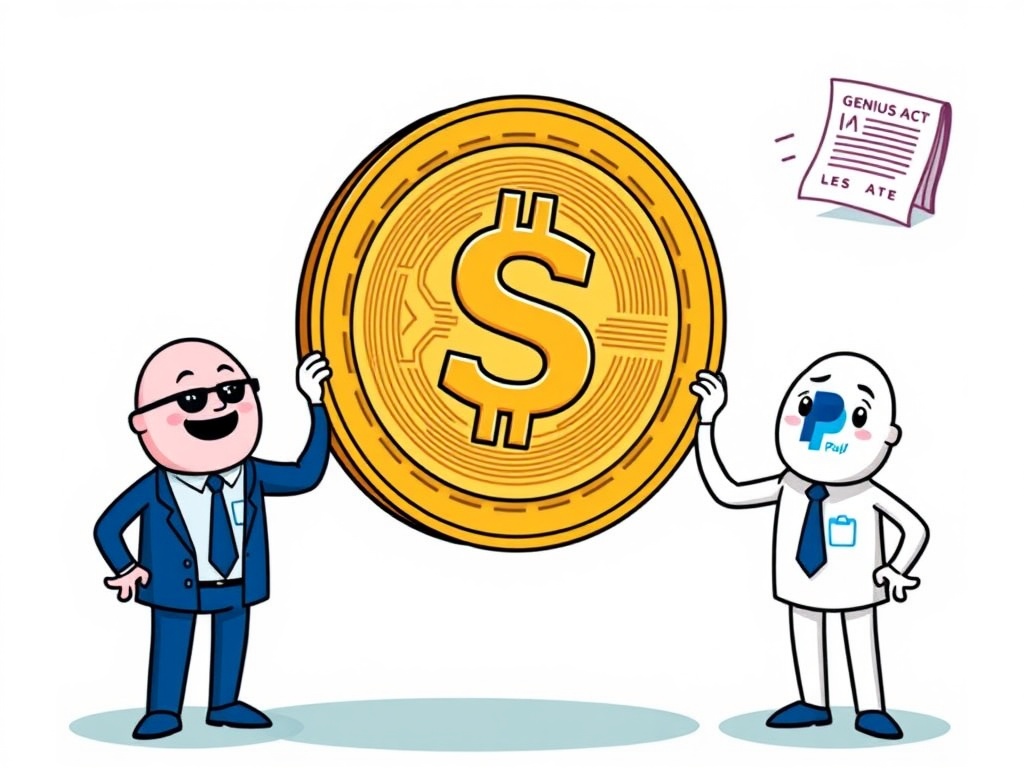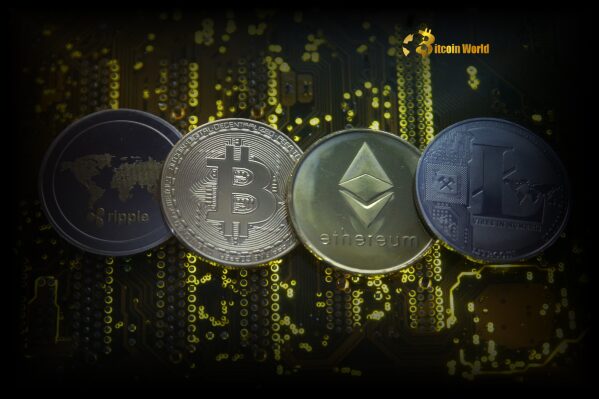BitcoinWorld

Stablecoin Rewards: Unlocking Continued Payouts from Coinbase and PayPal
The landscape of stablecoin rewards is buzzing with activity as major American firms like Coinbase and PayPal reaffirm their commitment to offering returns on digital dollar deposits. Despite new regulatory frameworks, these companies are confidently navigating the rules, ensuring their users can still earn from their crypto holdings. This ongoing commitment highlights a key trend in the evolving digital asset space, providing clarity for those interested in earning through crypto stablecoins.
Understanding the Stablecoin Rewards Landscape
Recent legislative efforts, specifically the GENIUS Act, aim to regulate the digital asset market, including stablecoins. A notable provision in this act prohibits stablecoin issuers from paying yield directly to holders. This has raised questions about the future of earning opportunities for users. However, companies like Coinbase and PayPal have a distinct interpretation of this rule, focusing on their role as non-issuers.
Both Coinbase and PayPal have clearly stated their position: they do not issue the stablecoins available on their platforms. Circle issues USDC, while Paxos issues PYUSD. This distinction is crucial to their strategy. By not being the direct issuers, they argue that the incentives they provide are structured as “rewards” rather than traditional interest or yield. This approach allows them to continue offering attractive returns to their user base.
For instance, Coinbase currently provides U.S. users with a competitive 4.1% annual return on their USDC deposits. Similarly, PayPal launched its program earlier this year, offering a 3.7% return on PYUSD. These offerings remain significant for users seeking ways to earn passively from their digital assets, reinforcing the appeal of stablecoin yield programs.
How Do Coinbase and PayPal Maintain Stablecoin Rewards?
The core of Coinbase and PayPal’s strategy lies in their classification as platforms facilitating access to stablecoins, not as the creators of these digital currencies. This legal nuance allows them to bypass the direct issuer prohibition. They act as intermediaries, connecting users with stablecoins and then structuring programs that incentivize holding these assets on their platforms.
Their executives have emphasized this point during recent earnings calls, reassuring investors and users alike. They frame their offerings as “rewards” for platform engagement and stablecoin adoption, rather than a yield derived from the issuance itself. This subtle but significant difference is key to their compliance strategy.
Consider the benefits for users:
- Consistent Earnings: Users can continue to earn competitive returns on their stablecoin holdings.
- Accessibility: Major platforms make it easy for a broad audience to participate.
- Clarity: The companies are transparent about their operational model regarding these rewards.
This model ensures that users can still benefit from Coinbase stablecoin rewards and PayPal stablecoin rewards without direct involvement in the issuance process.
What This Means for Crypto Stablecoins and Future Regulations
The stance taken by Coinbase and PayPal sets an interesting precedent within the evolving regulatory landscape for crypto stablecoins. It highlights the complexities of applying traditional financial regulations to decentralized or semi-decentralized digital assets. As regulators continue to define the boundaries, such interpretations will likely shape future policy discussions.
For users, this means continued opportunities to earn from stablecoins. However, it also underscores the importance of understanding the underlying mechanics of these reward programs. It’s crucial to differentiate between yield offered by an issuer and rewards offered by a platform facilitating access.
Looking ahead, the industry will closely watch how these interpretations are received by regulators. The ability of non-issuing platforms to offer attractive stablecoin yield could become a blueprint for other financial technology companies entering the crypto space. This ongoing dialogue between innovation and regulation is vital for the growth and stability of the digital asset economy.
In conclusion, Coinbase and PayPal are actively navigating the new regulatory environment by emphasizing their role as non-issuers of stablecoins. Their commitment to providing attractive stablecoin rewards for USDC and PYUSD holders ensures that users can continue to benefit from their digital assets. This strategic positioning not only offers ongoing earning opportunities but also contributes to the broader discussion on how crypto innovation can coexist with evolving financial regulations.
Frequently Asked Questions (FAQs)
1. What is the GENIUS Act mentioned in the article?
The GENIUS Act is a recently enacted legislation that includes provisions prohibiting stablecoin issuers from directly paying yield to holders of their stablecoins.
2. Why can Coinbase and PayPal offer stablecoin rewards if issuers cannot?
Coinbase and PayPal clarify that they are not the issuers of the stablecoins (USDC and PYUSD) they support. They act as platforms offering “rewards” for holding these stablecoins, distinct from direct yield payments from an issuer.
3. What stablecoins do Coinbase and PayPal offer rewards on?
Coinbase offers rewards on USDC (issued by Circle), and PayPal offers rewards on PYUSD (issued by Paxos).
4. Are these rewards considered interest or yield?
Coinbase and PayPal categorize their offerings as “rewards” rather than traditional interest or yield, specifically to differentiate them from the issuer-prohibited payments under the GENIUS Act.
5. What are the benefits of earning stablecoin rewards?
Benefits include earning consistent returns on digital assets, easy accessibility through major platforms, and transparent programs that allow users to passively grow their crypto holdings.
Did you find this article helpful in understanding stablecoin rewards? Share this insight with your friends and fellow crypto enthusiasts on social media! Your shares help us bring valuable information to a wider audience.
To learn more about the latest crypto market trends, explore our article on key developments shaping stablecoin adoption and its future potential.
This post Stablecoin Rewards: Unlocking Continued Payouts from Coinbase and PayPal first appeared on BitcoinWorld and is written by Editorial Team





